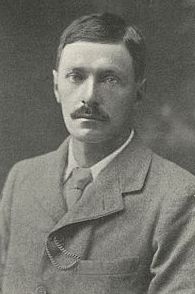JONH ELLINGHAM BROOKS, who died of liver cancer on this date, (b: 6/3/1863) was an English classical scholar. He was an associate and lover of Somerset Maugham, whom he met when they were both studying in Heidelberg in 1890. In later life, he was part of the circle of expatriates based on the Italian island of Capri, where he shared a villa with the novelist Edward Frederic Benson.
Brooks was educated at St. Paul’s College in Stony Stratford and at Peterhouse, Cambridge. Fearing prosecution as a homosexual following the trial of Oscar Wilde in 1895, Brooks moved to the island of Capri where he formed a friendship with the American heiress and painter Romaine Goddard when she visited in 1899. When she returned to Capri in 1903, she found that Brooks had fallen upon hard times and had been reduced to “selling his possessions to buy food.” In what E. F. Benson described as a “fit of aberration on the part of the bride and the bridegroom alike,” the two were married in Capri in June 1903. The marriage had ended by September 1904, but the allowance of 300 pounds per year that Romaine Brooks gave to her former husband was enough to allow him to live out the rest of his days on Capri.
Brooks stayed at a pension (boarding house) in Heidelberg in 1890, where he formed a close relationship with the young Somerset Maugham. His relationship with Maugham was Maugham’s first sexual experience and influenced his literary tastes. The character “Hayward” in Maugham’s Of Human Bondage, an “esthete who is just back from Germany and admires Pater” and influences Philip, the young protagonist, is generally accepted to be based on Ellingham Brooks. Five years later, Maugham and Brooks crossed paths again in Capri.
Maugham disapproved of Brooks’ indolent life in Capri and based the protagonist of the unflattering short story “The Lotus-Eater” on him. In The Summing Up, Maugham called Brooks “Brown” and wrote “For twenty years he amused himself with thinking what he would write when he really got down to it, and for another twenty with what he would have written if the fates had been kinder.”
Brooks’ artistic ambitions had amounted to little by the time of his death. E. F. Benson remarked that “Somewhere beneath the ash of his laziness there burned the authentic fire.”
